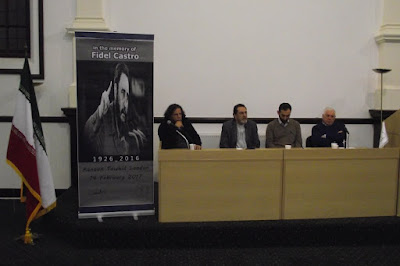A meeting in memory of Fidel Castro at the Kanoon Towhid Centre in Hammersmith, run by the Islamic Students Association (ISA), heard speakers from several countries honour the leader of the Cuban revolution’s life and ideals last week.
Opening the meeting, Dr Kamran Fathi from
the ISA said that Castro’s movement “inspired millions around the world from
all races and religions, and many other countries in Latin America and
elsewhere, with its ideals.”
He said the meeting would also remember
the life of Hashemi Rafsanjani, a lifelong supporter of the Palestinian
struggle who, like Castro, had always sided with the oppressed peoples of the
world.
Bernard Regan, national secretary of the
Cuba Solidarity Campaign, spoke of the modern history of Cuba and the Cuban
revolution, pointing out that education in Cuba is free at every level and that
its literacy campaign had been adopted by many countries, including Spain, New
Zealand and amongst indigenous peoples in Bolivia.
He said that starting in 1959 with no
health service at all, Cuba now has more doctors working abroad – 50,000 – than
the World Health Organisation, the International Red Cross and Médecins
Sans Frontières combined.
“Castro’s help to developing countries has
always been with no consideration for Cuba’s own interests. Its military
support for the government of Angola in 1987–88 and the crushing defeat for
apartheid South Africa’s NATO-backed military machine was a turning point in the
history of southern Africa.”
Ramon Grosfoguel, a Puerto Rican professor
based at the University of California in Berkeley, said that it was very
important that an Islamic organisation was holding a meeting to remember Fidel
Castro. He said Islam and Cuba held common values such as solidarity with other
peoples, in Iran’s case with Palestine, Lebanon and Syria. Puerto Rica, he
added, shared a common history with Cuba, both becoming US colonies after the Spanish–American
War in 1898.
Ramon said that Castro was not concerned
with religious or political beliefs, but the humanitarian needs of the
oppressed, and had acted with no concern for the consequences, “such as the
many assassination attempts against him.” His legacy, he said, “could be summed
up in one word – dignity.”
Masoud Shajareh, chair of the Islamic
Human Rights Commission in London, spoke about the importance of solidarity
with the oppressed: “Everyone, even Tony Blair and Adolf Hitler, claims to be
nice and to help the needy, but in reality they contributed to the downfall of
morality.
“Many people talk but take no action.
Oppression needs to be challenged and donating money is not enough. It is not
enough to pray five times a day, to fast, to memorise the Koran, you have to be
active in supporting those resisting injustice, colonialism and oppression, whether
in Palestine or Kashmir.”
Shajareh recalled the sanctions against
Iraq in the 2000s that resulted in half a million children dying of starvation
and compared Castro’s ideals with those of Ayatollah Khomeini, Hashemi
Rafsanjani, Nelson Mandela and Hassan Nasrallah, the leader of the Lebanese
Hezbollah party.
In the discussion, Bernard Regan pointed
out that although Cuba had made major breakthroughs in treatments for cancer,
diabetes and hepatitis, “the US drug companies have blocked publicity about the
new drugs and people in the US itself are suffering because they’re not allowed
to import them.”

No comments:
Post a Comment